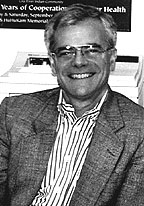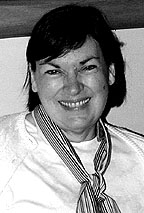

| T H E N I H C A T A L Y S T | J A N U A R Y – F E B R U A R Y 2001 |
|
|
|
| F R O M | T H E | D E P U T Y | D I R E C T O R | F O R | I N T R A M U R A L | R E S E A R C H |
PROTECTING THE INTEGRITY OF THE SCIENTIFIC ENTERPRISE
 |
| Michael Gottesman |
 |
| Joan P. Schwartz |
|
UNDER THE NEW POLICY, ALL RESEARCH STAFF IN THE NIH IRP WHO HAVE 'DIRECT AND SUBSTANTIVE INVOLVEMENT IN PROPOSING, PERFORMING, REVIEWING, OR REPORTING RESEARCH, OR WHO RECEIVE RESEARCH TRAINING' WILL BE PARTICIPATING IN [RESPONSIBLE CONDUCT OF RESEARCH] INSTRUCTION. |
Scientists appreciate that the significance of data in the literature is always subject to interpretation and that disagreements may legitimately arise. Falsification of data, on the other hand, is not tolerated. Research integrity demands that certain standards be maintained in performance and presentation of research. Two new policies, one from the White House Office of Science and Technology Policy (OSTP) and the other from the Public Health Service Office of Research Integrity, recently codified these standards. The OSTP policy defines scientific misconduct and how to handle it. The PHS policy describes a training requirement for all PHS-supported researchers.
First, a bit of history. Over the past decade or so, several scientific misconduct cases have reached the halls of Congress, raising the consciousness of many Americans about the consequences of a scientist’s committing scientific misconduct while doing research using public tax dollars.
As a result, the Commission on Research Integrity spent two years examining the problem and related issues and in 1995 made a series of recommendations to the HHS Secretary. Dr. Donna Shalala in turn established a committee to respond to those recommendations, and the OSTP convened the National Science and Technology Council, with representatives from all federal agencies that support research, to establish a definition of scientific misconduct that would apply government-wide. The final product was issued December 6, 2000.
It defines research misconduct clearly and succinctly as fabrication, falsification, or plagiarism in proposing, performing, or reviewing research or in reporting research results. This will be the subject of a column in the next issue of the Catalyst.
Regarding the training requirement for all PHS-funded researchers, the final PHS policy on Instruction in the Responsible Conduct of Research (RCR) and will affect all of us in the Intramural Research Program. The purposes of RCR training are to promote the responsible conduct of research and to discourage research misconduct and questionable research practices. The PHS has defined the long-term goals of this training as:
![]() To increase knowledge of, and sensitivity to, issues surrounding the responsible
conduct of research
To increase knowledge of, and sensitivity to, issues surrounding the responsible
conduct of research
![]() To improve the ability of participants to make ethical and legal choices in
the face of conflicts involving scientific research
To improve the ability of participants to make ethical and legal choices in
the face of conflicts involving scientific research
![]() To develop an appreciation for the range of accepted scientific practices for
conducting research
To develop an appreciation for the range of accepted scientific practices for
conducting research
![]() To provide information about the regulations, policies, statutes, and guidelines
that govern the conduct of PHS-funded research
To provide information about the regulations, policies, statutes, and guidelines
that govern the conduct of PHS-funded research
![]() To develop positive attitudes toward lifelong learning in matters involving
the responsible conduct of research
To develop positive attitudes toward lifelong learning in matters involving
the responsible conduct of research
Under the new policy, all research staff in the NIH IRP who have "direct and substantive involvement in proposing, performing, reviewing, or reporting research, or who receive research training" will be participating in RCR instruction. This includes senior investigators, tenure-track investigators, staff scientists and clinicians, research and clinical fellows, pre- and postdoctoral trainees, technicians, research nurses, and special volunteers or guest researchers involved in these activities.
Core areas defined for instruction in the PHS policy, and already covered in the "Guidelines to the Conduct of Research in the Intramural Program at the NIH" include data acquisition, management, sharing, and ownership; mentor and trainee responsibilities; publication practices and responsible authorship; peer review; collaborative science; research misconduct; and conflict of interest and commitment. Two additional core areas–human subjects and research involving animals–are covered by other required courses at NIH and will be dealt with to the extent necessary.
The new policy requires one-time training in all of the above areas, to be completed by October 2003 and complemented with yearly follow-ups. The NIH Committee on Scientific Conduct and Ethics (CSCE) has proposed that the one-time training be met through a web-based computer module that will cover all the areas; it is to be taken by all current staff before the deadline and incorporated into a web-based orientation package for all new staff.
For the yearly follow-ups, the CSCE strongly recommends the use of research ethics case discussions, led by a trained facilitator and given to groups of 20–30 people at a time. The Committee is developing a website that will contain sets of cases to be used for each topic and has decided that each year a theme will be chosen to be used NIH-wide. We are in the process of training investigators to serve as facilitators, who will ensure that everyone takes part in the discussion, that the key points are covered, and, most importantly, that the discussion is lively. This year (2001) the theme will be scientific misconduct. All staff will learn the new definition and the procedures for handling allegations of misconduct.
The ICs will have some flexibility in how they carry out the yearly training, but will be expected to adopt the theme chosen for that year. This mechanism will allow NIH to update staff on new policies relatively rapidly and inclusively. The CSCE has also been discussing the idea of developing a course in Research Ethics to be presented through the FAES Evening School, which would serve as a useful training tool for new facilitators. Any scientist interested in serving as a facilitator, or in helping to develop the FAES course, should contact his or her scientific director or CSCE member (for a list of IC representatives, see this website.)
Many of you have already participated in these research ethics case discussions—several institutes have been conducting them over the last few years—so you already know that they can be intellectually stimulating and even fun. Over the next few months, your ICs will be acquainting you with the new PHS policy and its ramifications. We advise you to get involved in the process, and we ask you to share with us your ideas about how to improve the training experience.
Deputy Director for Intramural Research
Assistant Director, OIR